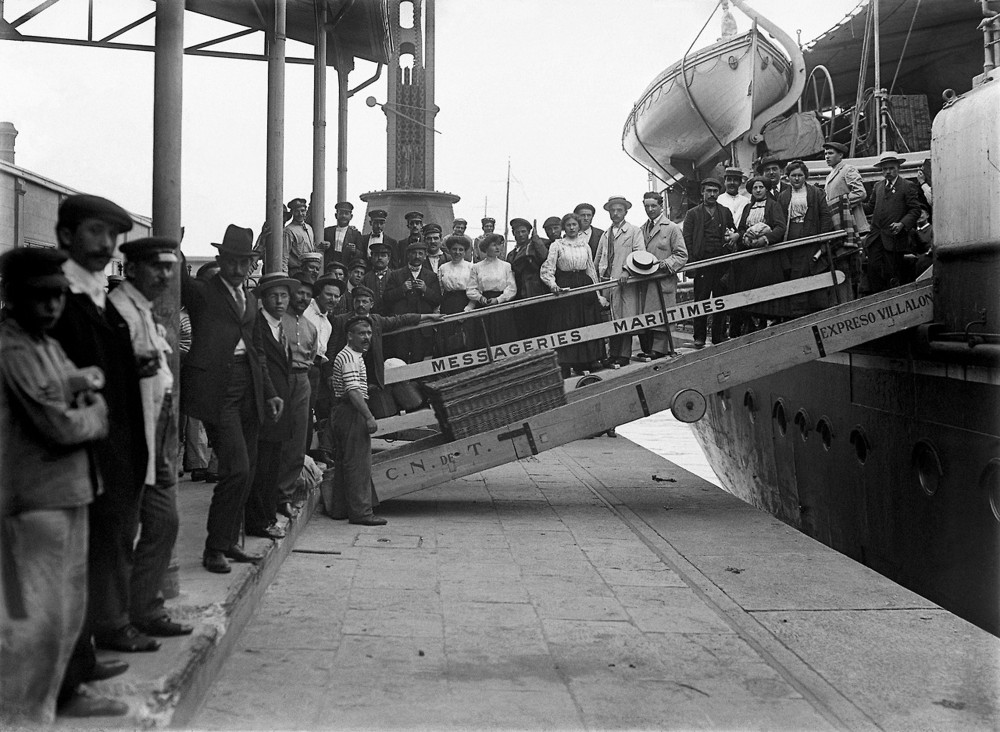|
Angolan Argentine
An Angolan Argentine is an Argentinian of Angolan descent or an Angolan naturalised Argentinian. Most of them arrived as slaves during the Spanish colonial period (16th–19th centuries). Currently, the Afro Argentine make up 0.4% of the population, and some are partially descendant from slaves from Angola. History Since the 15th century groups of African slaves were exported to Argentina. From the 16th century, most Africans brought to Argentina belonged to ethnic groups who speak Bantu languages, coming from the territories now comprising the Republic of Congo, the Democratic Republic of Congo, Angola and Mozambique. Many slaves of these countries were bought in Brasil, a country where most of the slaves were from these countries, especially from Angola. In 1680–1777 came at least 40,000 slaves in the region, while among the latter date and 1812, when traffic was halted, some 70,000 were landed in Buenos Aires and Montevideo (that figure must be added another, unknown, ... [...More Info...] [...Related Items...] OR: [Wikipedia] [Google] [Baidu] |
Buenos Aires
Buenos Aires ( or ; ), officially the Autonomous City of Buenos Aires ( es, link=no, Ciudad Autónoma de Buenos Aires), is the Capital city, capital and primate city of Argentina. The city is located on the western shore of the Río de la Plata, on South America, South America's southeastern coast. "Buenos Aires" can be translated as "fair winds" or "good airs", but the former was the meaning intended by the founders in the 16th century, by the use of the original name "Real de Nuestra Señora Santa María del Buen Ayre", named after the Madonna of Bonaria in Sardinia, Italy. Buenos Aires is classified as an Global city, alpha global city, according to the Globalization and World Cities Research Network (GaWC) 2020 ranking. The city of Buenos Aires is neither part of Buenos Aires Province nor the Province's capital; rather, it is an autonomous city, autonomous district. In 1880, after Argentine Civil War, decades of political infighting, Buenos Aires was federalization of Bueno ... [...More Info...] [...Related Items...] OR: [Wikipedia] [Google] [Baidu] |
Rio Grande Do Sul
Rio Grande do Sul (, , ; "Great River of the South") is a state in the southern region of Brazil. It is the fifth-most-populous state and the ninth largest by area. Located in the southernmost part of the country, Rio Grande do Sul is bordered clockwise by Santa Catarina to the north and northeast, the Atlantic Ocean to the east, the Uruguayan departments of Rocha, Treinta y Tres, Cerro Largo, Rivera and Artigas to the south and southwest, and the Argentine provinces of Corrientes and Misiones to the west and northwest. The capital and largest city is Porto Alegre. The state has the highest life expectancy in Brazil, and the crime rate is relatively low compared to the Brazilian national average. Despite the high standard of living, unemployment is still high in the state, as of 2017. The state has 5.4% of the Brazilian population and it is responsible for 6.6% of the Brazilian GDP. The state shares a gaucho culture with its neighbors Argentina and Uruguay. Befo ... [...More Info...] [...Related Items...] OR: [Wikipedia] [Google] [Baidu] |
Angolan Diaspora
Angolan may refer to: *Something of, from, or related to Angola *Angolan people; see Demographics of Angola *Angolan culture *Angolar Creole *Something of, from, or related to the historical Bantu Kingdom of Ndongo *A resident of: **Angola, New York **Angola, Kansas See also *List of Angolans *Languages of Angola * *Angola (other) *''Angolanidade Angolanidade ( en, Angolanness or Angolanity) is the national identity of Angola.James, W. Martin. ''Historical Dictionary of Angola'', 2004. Page 28. It can also be described as Angolan cultural patriotism. Much of what is today considered angolan ...'' ("Angolan-ness") {{Disambiguation Language and nationality disambiguation pages ... [...More Info...] [...Related Items...] OR: [Wikipedia] [Google] [Baidu] |
Immigration To Argentina
Immigration to Argentina began in several millennia BCE with the arrival of different populations from Asia to the Americas through Beringia, according to the most accepted theories, and were slowly populating the Americas. Upon arrival of the Spaniards, the native inhabitants of Argentine territory were approximately 300,000 people belonging to many Indigenous American civilizations, cultures, and tribes. The history of immigration to Argentina can be divided into several major stages: * Spanish colonization between the 16th and 18th century, mostly male, largely assimilated with the natives through a process called miscegenation. Although, not all of the current territory was effectively colonized by the Spaniards. The Chaco region, Eastern Patagonia, the current province of La Pampa, the south zone of Córdoba, and the major part of the current provinces of Buenos Aires, San Luis, and Mendoza were maintained under indigenous dominance— Guaycurúes and Wich� ... [...More Info...] [...Related Items...] OR: [Wikipedia] [Google] [Baidu] |
Angola–Argentina Relations
The Republic of Angola and the Argentine Republic are members of the Group of 77 and the United Nations. History During the Atlantic slave trade, Portugal and Spain transported many African slaves from Angola to Brazil, and from there were transported to Argentina. In November 1975, Angola gained its independence from Portugal. In September 1977, Argentina recognized the independence and established diplomatic relations with Angola. Soon after gaining independence, Angola entered into a civil war which lasted until 2002. In 1985, Argentine Foreign Minister, Dante Caputo, paid a visit to Angola. In May 2005, Angolan President, José Eduardo dos Santos, paid an official visit to Argentina. In May 2012, Argentine President, Cristina Fernández de Kirchner, paid an official visit to Angola. In 2013, Angolan Foreign Minister, Georges Rebelo Chikoti, paid a visit to Argentina and met his counterpart, Héctor Timerman. During the visit, both Foreign Ministers held a meeting within t ... [...More Info...] [...Related Items...] OR: [Wikipedia] [Google] [Baidu] |
Afro-Argentines Afro-Argentines are people in Argentina of primarily Sub-Saharan African descent. The Afro-Argentine population is the result of people being brought over during the transatlantic slave trade during the centuries of Spanish domination in the re |


